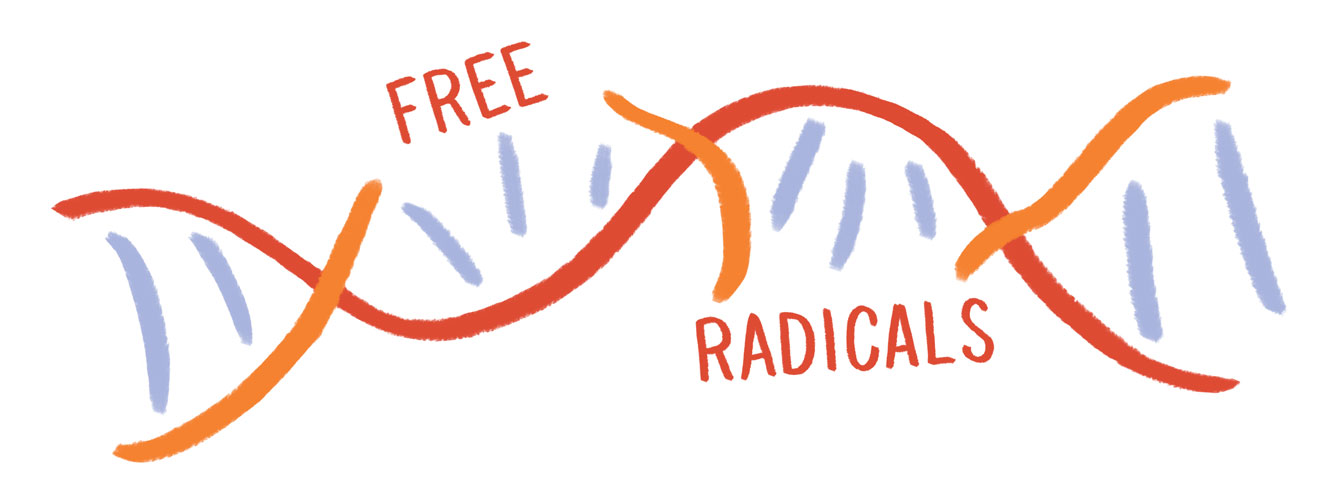
A digital illustration of the map of Russia superimposed by toxic warning signs and the chemical structures of pesticides labeled “Made in the USA.” The images are intended to demonstrate the influx of toxic pesticides made by US corporations into the unregulated markets of Russia. Artwork by Art Li .
Although Western countries have banned the use of toxic pesticides within their own borders, they continue to profit from their sale in other countries. What are the consequences of environmental reform efforts that only guarantee health for a select few?
Despite experiencing food shortages, housing crises, and targeted state violence during their 74-year lifetime, my Russian grandparents’ deepest fear is cancer. On a typical summer day, my grandmother is at peace, crouched down between the neat rows of fanning strawberry plant leaves, while my grandfather is relaxed as he paces across the lawn pushing his electric lawn mower. Yet when my grandmother is on the phone with one of her close friends, her voice is panicked when she admits that if their health were to be suddenly threatened, the best treatment center would likely be inaccessibly beyond national borders. The unavoidable possibility of cancer seems to lurk in random corners of their lives, waiting to snatch away their stable health at any moment.
Currently, their health depends on a small plot of land where spring, summer, and fall are spent maintaining a garden for food and taking walks for exercise. In the 1970s, the Soviet government allotted land to families for food harvest with the hope of alleviating citywide food shortages. After receiving a dacha, a rural plot of land, my family used every square meter of soil for potatoes, cucumbers, onions, garlic, tomatoes, apples, plums, gooseberries, and currants. The majority of the harvested food was then canned, frozen, or stored in a cellar so that my great-grandmothers, grandparents, and mother could eat food year round. As my grandparents grew older, and their daughter and grandchild were not around to give a hand, routine tasks involved in maintaining the dacha became burdensome on their aging bodies. They searched for ways to spend less time pulling weeds or picking pests off leaves with achy joints.
Around the same time that my grandparents began to move more slowly and take afternoon naps more frequently, it was the mid-90’s and the Soviet Union evolved into the Russian Federation. New products flooded Moscow’s stores. Multinational companies found new profit opportunities in the Russian market with products that had already built them corporate empires in the West. My grandparents were able to buy a chainsaw, an electric lawn mower, and many other tools that made it easier to sustain to their agrarian lifestyle and aging bodies on the dacha. In addition to these tools, another product that had not been on the Soviet Union-era shelves was now available in every store: pesticides.
Since their first use of pesticide sprays about 15 years ago, my grandparents have enjoyed their soft, green carpet lawn and long-lasting, pest-free harvest while spending less time and physical labor cultivating their land. Yet in the past four years, my grandparents’ summers have been sorrowed by the sudden death of their two cats from organ failure. After reading Rachel Carson’s Silent Spring, a collection of United States pesticide health impact case studies in the 1950s and 60s, it was difficult to not hypothesize a potential link between the pesticides my grandparents were using and the death of their beloved companions.
My grandparents were using clopyralid, cypermethrin, diazinon, and permethrin— pesticides banned for public use in the United States and some Western European nations after numerous studies linked the pesticides to decades of damage to human, animal, and environmental health. The Environmental Protection Agency (EPA), which is a U.S. federal agency created for protecting human health and the environment, has labeled all of these chemicals as toxic. The EPA banned clopyralid, an artificial chemical that mimics plant hormones to inhibit plant growth, from public use in 2002 after consistent reports of human eyesight impairment. Research showed that when rabbits ingested clopyralid, there was a reduction in the weight of fetuses along with an increase in skeletal abnormalities and cases of hydrocephaly, or accumulation of excess fluid in the brain. Since 2004, the EPA has mandated similar jurisdictions against the use of diazinon after the pesticide was linked to non-Hodgkins lymphoma cases among farmers using the spray in Nebraska, Iowa, and Minnesota. Banned by the EPA for its extremely high toxicity to fish, cypermethrin also affects neurotransmitters in mammals and cold-blooded animals. The pesticide is classified as a carcinogen, as studies show an increase in lung tumors for mice that inhale the pesticide and bone marrow chromosome abnormalities in human and mice cells. The last of the pesticides my grandparents were using—permethrin—has been labeled as a “likely carcinogen” by the EPA since 2006. Although the chemical is derived from organic material like the chrysanthemum plant, at high and isolated concentrations it interferes with nerve impulses in mammals and is extremely toxic to bees, fish, and cats. Additionally, some of these pesticides do not degrade through compost or rain wash, and cycle through environmental systems thus having a broad and lasting impact on anything that ingests the chemicals.
Asgrow, a Monsanto-affiliated company, sells these four pesticide powders in plastic baggies with brightly colored illustrations of plants and brief three-step instructions. With no chemical warnings, they are priced affordably for a market of post-Soviet families with dachas hoping to continue their food harvesting traditions. Currently, there is a large demand to continue family gardens since the Russian ruble has dropped in value. In addition, sanctions on Russia from the European Union have caused prices of food products to increase relative to stagnant wages. Pesticide companies benefit from the economic situation because their products guarantee larger food yields and less crop maintenance labor, allowing Russians to afford food for their families from the dacha as well as from corporate food growers. For example, the sanctions coupled with inflation have created an economic downfall where people have a higher demand for bread, yet the price of one loaf has increased and the quality has worsened. Due to an inability to import materials, Russia must rely on its own supply of grains, thus causing the cost of bread ingredients to rise. The quality deterioration occurs via the use of bromomethane, a pesticide known to damage the respiratory system in humans, to maintain a consistent yield of grains in an attempt to keep bread prices low. This tradeoff endangers the health of those who depend on cheap food and who might not have alternative food choices, even if they knew about the harmful effects of the pesticide.
Russian institutions have and currently do recognize the presence of pesticides and the consequential worsening of community health within its borders. During Soviet times, bromomethane was prohibited from application to crops because of its serious health effects on farmers and consumers, but ever since the economic switch from communism to capitalism, the Russian Federation has allowed the pesticide to be used domestically. However, the Russian government halted the importation of several tons of fresh produce in the past year due to the falsification of biological certifications and a resulting uncertainty in pesticide usage. Claiming that the fresh fruits and vegetables could contain traces of restricted pesticides, Russia halted the entrance of 57 tons of produce into the country last December, further limiting sources of food. Although it appears to send a message to exporters on pesticide transparency, the inconsistency in allowing usage of bromomethane within borders casts doubt on the altruism of this policy: it suggests that the government is aware of the dangers of pesticides, but would rather prioritize market politics over peoples’ health.
Approaches to limiting pesticide exposure to Russian people begins in the interconnectedness of the farm-to-mouth journey, regulating government institutions, and interpersonal relationships. Thus far, Russian news responses isolate the pesticide health crisis to particular bodies and produce, glossing over the omnipresence of the chemicals. For example, one article from a major news source narrows the conversation on pesticides and heavy metals to only pregnant women, although the chemicals affect the nervous and immune systems of all body types. In another major new source, an article warns that buying flowers for International Women’s Day, a major national holiday in Russia, contributes to major pesticide runoff pollution; the World Wide Fund suggested that consumers look to more environmentally friendly options. But given that the majority of the medical terminology surrounding pesticide exposure is in English, it is almost impossible to expect that the average citizen stay informed independently. After all, even beginning to learn about the pesticide linked health risks exhausts my grandparents. The language barrier creates an added difficulty across all generations to alter their lifestyles to reduce their health risks.
What is absent from the conversation is the importance of taking care of all bodies— not just the wombs that the government depend on for population growth—and identifying high-risk communities with limited accessibility to and knowledge of pesticide-free foods. If pesticides are being used on flowers, in what other produce and processed foods are traces found? Isn’t accurate labeling for stores, consumers, and farmers necessary to sustain the human right to health and safety? At the national scale, health and environmental damage is further perpetrated by Western companies that claim to be multinational, but maintain drastically different standards between their country of origin and countries of profits. One way in which these companies poison beyond their borders is through a loophole that allows United States-based pesticide producers to manufacture non-EPA registered chemicals in the United States as long as they only export them to unregulated markets. At the international level, why is it that the most recent international convention on pesticides was the Stockholm Convention in 2001, which banned only twelve pesticides? Will there be a collaboration that will regulate movement between markets for human and environmental health?
My grandparents have been taught all of their lives never to throw anything away—this was the life code by which Soviet Russians swore to survive decades of resource scarcity. Although there are plenty of obstacles to breaking such ingrained habits, I know that for now, I can help my grandparents develop a healthier relationship with the dacha by translating studies of these pesticides for them and developing alternative pesticide variations—ones that even Red, our favorite Russian mother on Orange is the New Black, remembers. Just a little bit of garlic, vinegar, and hot pepper to deter the pests and preserve the plant. Hopefully, these small steps can help reduce not only my grandparents’ fear of cancer, but also their risk.





